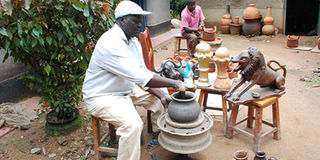The potters of Ilesi: Villagers turn clay into fortunes in Kakamega

Mr Jacob Mate Shiamwama (left) and his colleague carry out their pottery business at Ilesi village in Kakamega County. PHOTO | ISAAC WALE | NATION MEDIA GROUP
What you need to know:
- Shiamwama has managed to build a modern house and educate his children through money earned from pottery.
- A small cooking pot goes for Sh100 while a flower vase costs between Sh300 and Sh600. The cheapest energy-saving stoves made from the special type of clay are sold for Sh200.
An ordinary day at Ilesi market is usually forlorn, except for the presence of boda-boda operators waiting in the searing sun to pick up passengers heading to the nearby Khayega market.
The tiny Ilesi market, on the busy Kakamega-Kisumu road, is dotted with makeshift kiosks. A short distance from the market stands the chief’s office and an administration police camp.
Along the road, however, an array of beautiful pots and other items made from clay and decorated in colourful styles are displayed, easily attracting potential buyers, often travellers and tourists.
Ilesi village in Kakamega East Sub-County has carved a niche as the home of pottery in western Kenya.
ECONOMY
Pottery may sound mundane for families who have embraced modern ways of life, but villagers in Ilesi are reaping from their creativity and hard work.
From distant swamps where they harvest the raw material, the potters have the skill to convert clay into cash by making and selling traditional water pots, bowls, flower vases and others. Besides pottery, villagers engage in subsistence farming for a livelihood.
Motorists driving on the road are assured to catch a glimpse of assorted pottery, and many stop by to buy one or two of the assortments, thereby boosting the economic position of the potters.
Further, the demand for earthenware in Uganda and Tanzania has triggered a frenzy of activities among villagers, who want to exploit the opportunity to improve their lives.
DEMAND
One such man is Mzee Jacob Mate Shiamwama, 57. He started making pottery in 1963, when he was just 13 years old, and has never looked back.
Mr Shiamwama is highly respected for his expertise. From selling pots on the roadside, he has managed to build a modern house and connect electricity to it.
He has also educated his four children all the way to college using money earned from the business.
“I decided to learn the craft after dropping out of school in 1963. A I do not regret making the decision since what I earn has transformed my life,” he said.
His clients are from different parts of the country. The growing demand for the items has seen his son join him, easing the workload.
APPRENTICESHIP
Mr Shiamwama is keen on passing the craft to his children, an occupation he says he learnt from his late grandfather. He said his wares had found their way to markets in Central Kenya, Nairobi and Mombasa.
“Buyers also come from as far as Kampala and Dar es Salaam, because our pots are unique in design and decoration,” he added.
His son Godfrey Itambe opted to join his father in making pots after completing his secondary school and taking up a project management course at Kenya Institute of Management.
“I’m happy working on the project with my father since what we make has made our lives promising,” Mr Itambe said.
CULTURAL CENTRE
Next to Ilesi is the legendary crying stone of Kakamega. And with many people stopping by for a view, the county government is now planning to set up a community cultural centre next to the shrine.
This move will not only boost the region’s tourism potential, but the potters of Ilesi are assured of more customers for their wares.
Among the Isukha and Idakho subtribes of the Luhya community, the Abashitao and Basaka clans are reputed for their mastery in pottery.
The tradition of pottery has a strong place in the community, and those distinguished in the art are highly regarded for the contribution they make to preserve and promote the activity.
A small cooking pot goes for Sh100 while a flower vase costs between Sh300 and Sh600. The cheapest energy-saving stoves made from the special type of clay are sold for Sh200.





